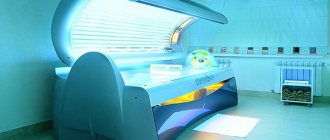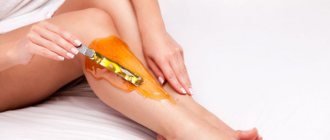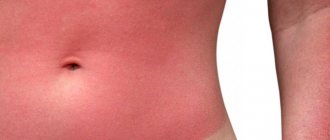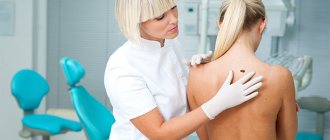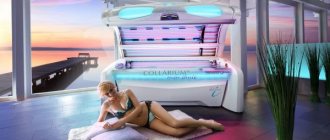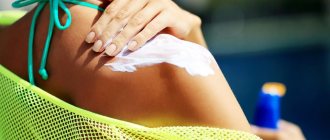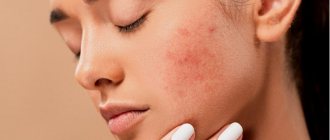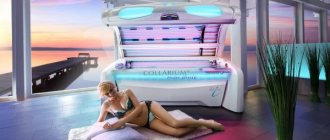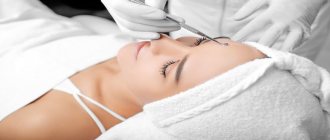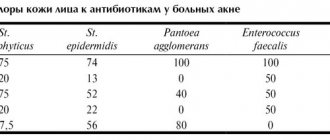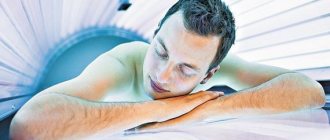November 8, 2010
Tanning in Russia is still in fashion. But are there any benefits to tanning in a solarium? The specialist says.
Tanning in Russia is still in fashion. Especially among residents of the middle zone and colder regions, who manage to see the sun only a few months a year. It is for them that solarium services are provided in almost every city - in fitness centers, beauty salons and even in baths and saunas. But are there any benefits to tanning in a solarium? Sergey Chub, Candidate of Medical Sciences, employee of the Central Research Dermatovenerological Institute of the Ministry of Health and Social Development of Russia, tells.
What do scientists think about solariums?
Healthy skin
How to keep your skin healthy? Nutrition and water, sun and bad habits, sleep and the health of the body as a whole - Anna Kubanova, director of the State Scientific Center for Dermatovenereology, talks about the factors influencing skin health.
“A good example of the effects of ultraviolet radiation, or, in other words, UV rays, is the use of “blue” lamps to disinfect medical instruments, operating rooms and other hospital rooms,” says Chub.
“UV rays kill most bacteria.” According to various studies, addiction to tanning in solariums in people under the age of 30 increases the risk of developing one of the most dangerous types of malignant tumors - melanoma
.
This is why several years ago the UK banned the provision of solarium services to minors. And in 2009, the World Health Organization (WHO) classified tanning beds as one of the most significant risk factors for cancer
. This category also includes tobacco, asbestos, arsenic and other recognized carcinogens. Now WHO categorically does not recommend using tanning beds for cosmetic purposes.
Horizontal or vertical
There are two types of solariums – horizontal and vertical. There is an opinion that in the latter you will get a tan faster, but this is just a myth. In the vertical one you will not be in contact with the lamps, and in the horizontal one you will touch the surface on which an unknown number of people lay before you, but relax. Now the choice is yours!
Why are solariums harmful?
Ultraviolet rays reaching the Earth's surface are divided into two types: A (UVA) and B (UVB)
.
UVB rays primarily cause thermal sunburn. Type A rays can penetrate into the deep layers of the skin - the dermis. They can suppress the immune system, destroy cell DNA and cause cancer. With uncontrolled exposure, ultraviolet rays become the No. 1 factor in the development of skin cancer
.
Moreover, it does not matter what the origin of UVA rays is - from the sun or a lamp in a solarium - they are equally dangerous. The radiation from solarium lamps, like sunlight, contains mainly UVA rays. However, in tanning salons, a person receives a dose of ultraviolet radiation that is more than 10 times higher than normal solar radiation
. According to various estimates, 10 minutes - the standard time spent in a solarium - can be equated to two hours of exposure to the southern sun. UVA rays provoke increased formation of the melanin pigment, which turns the skin brown. And this leads to the development of melanoma - the most common malignant tumor, frequent cases of which are associated with the passion for tanning.
Do UV rays help with rashes on the face and back?
Even the most ancient healers noted the benefits of sunbathing and recommended it to patients with a variety of diseases, including skin diseases.
Subsequent studies have proven that the devices used in solariums have the same effect on the body as the sun's rays. They are really capable of improving the condition of the skin on the face and other parts of the body, as they have the following actions:
- antibacterial and disinfectant - reduces the activity of pathogenic microorganisms and gets rid of the root cause of acne;
- promote the production of vitamin D;
- give the skin a beautiful, even tan;
- suppress the activity of the sebaceous glands, less sebum is produced.
But it is worth noting that ultraviolet light does not burn pimples, but only dries them and the skin in the area where they are localized. It stops intradermal inflammatory processes, therefore, with regular solarium sessions, you can really get rid of acne.
The advantage of this procedure is that the rays affect the skin of the entire body, including on the back and butt - areas hidden under clothing and receiving little natural sunlight.
Why don't tanning beds improve your appearance?
UVA rays destroy collagen and elastin
, which are responsible for the elasticity of the skin, and dry it out.
Cosmetologists believe that those who tan in solariums gradually become dull and, after the tan fades, acquire a grayish tint. And the tan itself from a solarium often turns out to be an unnatural shade. In addition, all wrinkles and age spots become clearly visible on the skin. The solarium does not improve her condition - it does not help with acne and other skin problems. “Tanning beds don’t cure acne,” says Chub. “Simply stimulating the immune system with excess UVA radiation
gives it a jolt for a while But if you are constantly exposed to sunlight, your skin suffers even more.”
How to get rid of acne* on the décolleté and other areas of the body?
Regardless of the cause of the rash, you should contact a dermatologist. The doctor will tell you how to get rid of acne* on the décolleté and other areas and prescribe adequate treatment. Thus, for mild to moderate acne, therapy may include the use of azelaic acid, for example, Azelic® gel5,9. One of the properties of the drug is the normalization of keratinization processes in the follicles5.
*acne
Who should not sunbathe in a solarium at all?
People with pale skin, freckles and red hair. Women during menstruation. People with skin diseases. Pregnant and lactating. People with a large number of moles and age spots. When taking certain medications. Be sure to consult with the doctor who prescribed the drug, and carefully read the instructions for the medications. For acute colds, asthma, hypertension, atherosclerosis, blood diseases and a number of other diseases. If you have acute or chronic illnesses, consult your doctor about whether you can use a solarium.
It is contraindicated to visit the solarium
- Children under 18 years old
- Presence of oncological diseases, tumors
- Diseases of the cardiovascular, urinary and nervous systems, tuberculosis, bronchial asthma
- Skin diseases, presence of purulent wounds
- A large number of moles on the body. If there are more than 50 moles on your body, then doctors advise you to forget about the solarium and even tanning under natural sunlight
- Menstruation period
- Taking hormonal, anti-inflammatory, antibacterial drugs
If you still decide to sunbathe in a solarium
Visit a dermatologist and get his permission to tan under ultraviolet lamps. This same specialist will determine your skin type and tell you how long and with what regularity
you can sunbathe in a solarium.
Before visiting the solarium, take a shower and wash off all decorative cosmetics, perfume and traces of deodorant. Cosmetics
exposed to ultraviolet rays can lead to skin irritation and even allergies.
Use sunscreen
intended for tanning in a solarium, be sure to apply it to the thin skin of the eyelids and lips.
Don't expose your breasts
.
It is ideal to sunbathe in a swimsuit, but it is acceptable to wear stickers on your nipples and areas. Remember that after 30 years, the risk of developing breast tumors increases many times, and solarium further increases this risk. moisturizers
specifically designed for this type of tanning after tanning in a solarium
Do rays affect acne spots?
After attending a course of artificial tanning sessions, you can expect not only healing, but also aesthetic results, and experts confirm this. Under the influence of ultraviolet light, the production of melanin is stimulated - this pigment gives the skin a darker color.
Against the background of an even, bright tan, the spots remaining on areas with healed acne are almost invisible. In addition, when skin cells heat up, they begin to regenerate more actively. The shade of the reddened areas, due to the formation of new cells, becomes paler and begins to look healthier.
The most important
It should be remembered that tanning in a solarium is not only not healthy, but also dangerous to health due to the increased dose of ultraviolet rays.
But if you are still going to sunbathe this way, consult your doctor and be extremely careful. Tags:
- Appearance
- Ultraviolet
- Cancer
- Safety
- Leather
- Forelock
2 comments • To leave a comment you must be an authorized user
- SmoothGirl I didn’t go and don’t go for the reason... “Who shouldn’t sunbathe in a solarium at all? 1. People with pale skin 2. People with a large number of moles “I think that dermatologists still know more about the dangers of solariums than doctors of other specializations.
- ekaterinarus Solarium is a drug! I went for 2 years except for health problems, it brought me nothing! Yes, it’s beautiful, tanned skin, but it’s not worth it! My husband forbade me to go! Now, after 1.5 years, I’m used to doing without it, but the pigment spot remains!
What is the effect of the sun and solarium on the skin?
In general, the effect of sunlight on the skin can be called beneficial. Ultraviolet light has several specific properties that are necessary in the fight against acne:
- Antibacterial - pathogenic microorganisms are affected by ultraviolet light, in this sense, ultraviolet light is considered a natural antimicrobial and disinfectant;
- Anti-inflammatory processes occur much faster under the influence of sunlight;
- The positive properties of a solarium can also include a purely visual effect. But the effect of sunlight on the skin occurs only at a low intensity of exposure. Excess ultraviolet radiation can lead to the opposite effect, increasing the rash. What is a solarium?
Basic visiting rules
Whether a solarium will be beneficial or harmful for psoriasis depends on how accurately the patient follows the dermatologist's instructions. Basic visiting rules:
- The duration of the full course is 20-30 sessions.
- Frequency – no more than 1 time in 2 days.
- Each session is no more than 5-6 minutes.
- The timing of the visit is better during the period of remission, and not at the time of exacerbation.
In order for the body to adapt, it is worth starting with 2-3 minutes of tanning. The main thing is not to exceed the maximum time, defined by experts as 5-6 minutes. Dermatologists recommend a vertical solarium because it evenly affects the skin of the entire body. You should also first check with a specialist for a list of drugs that are incompatible with ultraviolet radiation. This is important because any patient uses a special ointment for psoriasis.
Sunscreen and acne
Dermatologists strongly recommend always using an oil-free sunscreen when going outside during the hot summer months. People who use sunlight (ultraviolet) light as an attempt to reduce acne may clog their pores by using thick, oil-based sunscreens. However, non-comedogenic sunscreens are suitable for sensitive and oily skin. skin, can be applied for tanning even every day, and they will not clog pores and cause acne, as is the case with conventional creams.
How to avoid side effects
- Always wear safety glasses when using a tanning bed. The cornea and connective tissues of the eye can easily become inflamed.
- Try not to wear perfume or deodorant before the procedure.
- Use professional tanning cosmetics. This will save your skin from damage.
- Never stay in a tanning bed for more than 20 minutes.
- Never visit a tanning salon twice a day.
- Protect hair and sensitive parts of the body. Use special breast applicators and lip balm.
- Be sure to cleanse and exfoliate your skin before your session.
KK con. st I
feed
Rate the material: ( 1 ratings, average: 5.00 out of 5)
